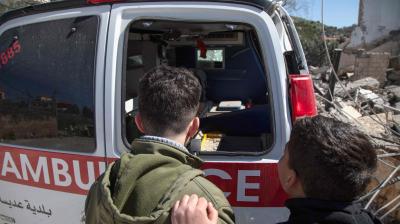European Union sounds alarm as internal barriers rise
The European Union’s chief executive warned on Wednesday that the survival of Europe’s “partially comatose” open border travel zone and its single currency were both at risk if member nations continue
The European Union’s chief executive warned on Wednesday that the survival of Europe’s “partially comatose” open border travel zone and its single currency were both at risk if member nations continue erecting internal barriers to keep out refugees.
European Commission president Jean-Claude Juncker drew a direct link between the two key achievements of EU integration, telling the European Parliament the euro would be jeopardised if the Schengen passport-free travel system unravels.
“If the spirit of Schengen leaves our lands and our hearts, we will lose more than Schengen. A single currency makes no sense if Schengen falls. It is one of the keystones of European construction,” Mr Juncker said.
While there is no legal connection between the Schengen zone, which has 22 EU members and four from outside the bloc, and the 19-member euro zone, Mr Juncker’s warning reflected growing concern in Brussels that intra-EU tensions over migrants could reverse the post-World War II war drive for European unity.
He sounded the alarm as some 1,500 migrants remained trapped in northern Greece unable to cross the border into Macedonia after Western Balkans countries overwhelmed by the refugee flow began limiting their intake to Syrians, Afghans and Iraqis.
The United Nations condemned the new restrictions with Secretary-General Ban Ki-moon saying that “profiling asylumseekers on the basis of their alleged nationality infringes the human right of all people to seek asylum, irrespective of theirnationality, and to have their individual cases heard”.
Tens of thousands more migrants are stranded in Macedonia, Serbia and Croatia after Schengen zo-ne countries further north built fences to seal their borders. New arrivals from Turkey to the Greek Aegean islands have slowed this week despite fair weather in a possible sign of more effective Turkish action to clamp down on people smugglers.
Turkish Prime Minister Ahmet Davutoglu is due in Brussels on Sunday for a summit with EU leaders meant to seal a joint action plan under which European countries will provide 3 billion euros in aid to help keep refugees in Turkey.
But days before the meeting, senior EU officials said a deal had not been finalised, with the funding, the pace at which Ankara’s long-stalled EU membership talks can advance and whether Brussels can deliver on its promise of easier travel for Turks all unresolved, EU and Turkish officials said.
Meanwhile, German Chancellor Angela Merkel, whose country has borne thebrunt of hundreds of thousands of migrants who have poured into Europe from the Middle East and Africa in 2015, said the open border system would only endure if EU member states accepted a permanent, mandatory quota system for sharing out refugees.
Merkel rebuffed growing pressure from her own conservatives on Tuesday to impose a limit on the number of refugees Germ-any would admit. It made no sense to try to curb the migration flow that way if Europe was unable to control its external borders, she said.
In the northern Greek town of Idomeni, a group of Iranian asylum-seekers on hunger strike, many nearing collapse, sat in the rain on the train tracks with their shirts off.
Nearby, about 200 to 300 Algerians and Moroccans faced Macedonian border guards, chanting “Mrs Merkel, please help us!”
Meanwhile, US vice-president Joe Biden arrived in Zagreb on Wednesday for a Western Balkans summit, highlighting renewed interest from Washington in the fragile region as it deals with an unprecedented influx of refugees.
There was tight security in the Croatian capital with 4,000 police deployed for the event and some schools closed downtown. Mr Biden was due to meet various leaders, including EU President Donald Tusk, individually ahead of the afternoon summit. The meeting in Zagreb, attended by eight heads of state and Mr Tusk, aims to boost “cooperation and mutual trust at a moment of increased security ris-ks”, said Slovenian Presi-dent Borut Pahor, who is co-hosting the summit.

















